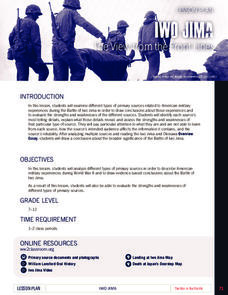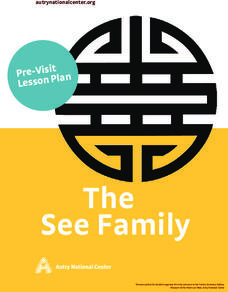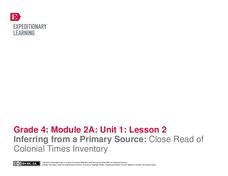Historical Thinking Matters
Social Security: 3 Day Lesson
What does social security reveal about the political and social culture of the 1930s? After beginning with a brief introductory video on the impact of the Great Depression and how various Americans, such as Huey Long and Francis...
Curated OER
Little House in the Census: Almanzo and Laura Ingalls Wilder
How would you use census data from 1880-1900? Here are a set of ways you can incorporate the book Little House on the Prairie and US census data from that time period. Learners will research the validity or the book based on factual...
Curated OER
Iran Hostage Crisis: Reading Primary Documents
Following brief instruction about the Iran Hostage Crisis during Jimmy Carter's presidency, small groups read three-page sections from the diary of hostage Robert C. Ode. They write editorials from the perspective of either U.S. citizens...
Curated OER
Who Fought for the Union?
Learners read New York Times articles, letters, and listen to songs written from a soldier's perspective during the Civil War in order to understand who was fighting in the Union Army. This is a great lesson, complete with weblinks,...
Curated OER
Colonial New York Slave Codes: Pedro's Walk
Look critically at the slave laws instated in Colonial New York. Your class examines primary source documents, slave laws, a narrative account from a slave's perspective, and Slave Codes. They write diary or journal entries in response...
Curated OER
Using Primary Sources: Letters from the Presidents
Young scholars find out about the minds and thoughts of presidents through reading their actual letters. They explore the personal lives of presidents. They answer questions about a primary source. They write essays.
National Endowment for the Humanities
David Walker vs. John Day: Two Nineteenth-Century Free Black Men
What was the most beneficial policy for nineteenth-century African Americans: to stay in the United States and work for freedom, or to immigrate to a new place and build a society elsewhere? Your young historians will construct an...
Curated OER
Using Primary Source Documents in the Classroom
Students use primary documents to explore the past. They consider the source of the documents and identify and biases that the author may have held. They identify any questions about the historical event that may remain after reading the...
Curated OER
Understanding and Using Primary and Secondary Sources in History
Explore primary and secondary sources in this historical analysis activity. Young researchers define the terms primary source and secondary source. They read a primary source document provided by the teacher and answer questions about...
National WWII Museum
Iwo Jima: The View from the Front Lines
Iwo Jima was the site of some of the most grim fighting in World War II. Learners consider this fact while examining primary sources, including letters home, from those on the front lines. After they complete the analysis, scholars then...
Historical Thinking Matters
Rosa Parks: 5 Day Lesson
What led to the success of the Montgomery Bus Boycott, and how might historians approach this question differently? This rich series of lessons includes a short introductory video clip, analysis of six primary source documents, and...
Center for History Education
Was the Stamp Act Fair?
Pledge your loyalty to the king and the Stamp Act or sign an oath against the tax. After simulating an in-class tax for school supplies, young historians consider the reasons for the Stamp Act and similar colonial policies. The...
Roy Rosenzweig Center for History and New Media
Continental Differences
Students break into groups and closely investigate primary sources associated with the seven different continents. After deciding which continent their primary sources relate to, representatives from each group present their findings to...
National Endowment for the Humanities
The Question of an American Empire
As it rose to being the new super power, America had a choice: conquer other nations like its European predecessors, or stay home. Using primary source documents from those thinking about American foreign policy in the late 1800s,...
City University of New York
Urban Politics: Machines and Reformers
Take a trip to the turn of the twentieth century with a resource about industrialism in America. With primary source documents and focus questions, learners think about the ways that government groups and organizations paved the way for...
K20 LEARN
Whose Manifest Destiny? Westward Expansion
Your land is my land! Young historians investigate the concept of Manifest Destiny used by the United States government to justify western expansion. Jigsaw groups read primary source documents to gain an understanding of the movement...
National Endowment for the Humanities
Lesson 1: The United States Confronts Great Britain, 1793–1796
After the Revolutionary War, the success of the United States was far from guaranteed. Foreign powers coveted the new land, and Great Britain challenged American sovereignty. Learners consider the challenges facing the new nation using...
Digital Public Library of America
Teaching Guide: Exploring Little Women
Louisa May Alcott's Little Women is a literary masterpiece as well as a timestamp of the formative mid-nineteenth century in America. Using a primary source set of photographs, letters, and portraits, readers discuss the ways...
Curated OER
Tintin and I: Primary and Secondary Sources
Mickey Mouse, Elmo, and Tintin? Belgian cartoonist Georges (Herge) Remi’s famous comic character launches a study of primary and secondary source material and the impact these sources have on storytelling. Class members also examine the...
Curated OER
A Lesson To Accompany "The First Bank of the United States: A Chapter in the History of Central Banking"
Here is an interesting topic. Learners examine the economics that led to the founding of the First Bank of America. They participate in a reader's theater experience depicting the debate between Alexander Hamilton and Thomas Jefferson...
Curated OER
The See Family
Third graders examine photographs as primary source documents. Students are broken into groups and are given photographs of the See Family.
Library of Congress
The Emancipation Proclamation and the Thirteenth Amendment
How did the Emancipation Proclamation lead to the Thirteenth Amendment? Middle schoolers analyze primary source documents including the text of the Emancipation Proclamation, political cartoons, photographs, and prints to understand the...
EngageNY
Inferring from a Primary Source: Close Read of Colonial Times Inventory
Teach your class about colonial America through an examination of primary documents. First though, start vocabulary notebooks for content-specific and academic vocabulary. Pupils can keep this record during the entire module. Once this...
Curated OER
What Is a Primary-Source Document?
Students discover what a primary-source document is, what different types there were back in 1867, and what newer kinds there are today. They play a form of bingo using printed cards that reproduce documents related to Confederation.

























